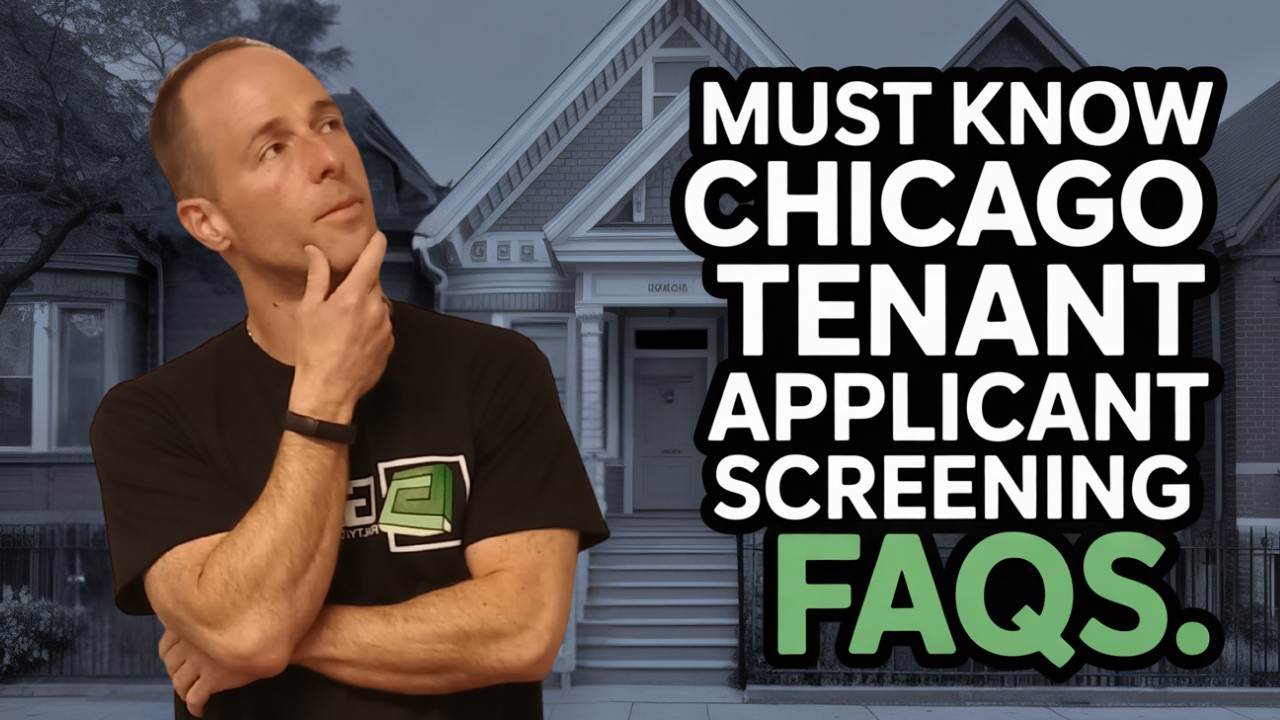
Author: Mark Ainely | Partner GC Realty & Development & Co-Host Straight Up Chicago Investor Podcast
These are the questions I get asked all the time by Chicago investors like you. Today, I want to share all of the answers with you about these investor questions.
If you are reading this, you obviously care about putting the right tenant in your unit and you want to lower your risk, so kudos to that.
If you are reading this after you have an issue, this is still great info to know or read down to see if we can help.
This Q&A guide is designed for Chicagoland landlords who want to learn about what they don’t know about when it comes to tenant screening in today’s market.
Every question comes from real challenges landlords face, from scammers with fake pay stubs, to Fair Housing compliance in Cook County. If you own rental property in the city or suburbs, these insights will help you master tenant screening and keep your investment on track.
Q&A: Tenant Screening in Chicago 2025
Q: What’s new in Chicago’s landlord-tenant laws for 2025 that directly impacts screening?
A: A handful of updates stand out:
The Illinois Landlord Retaliation Act makes it illegal to retaliate when tenants exercise rights—document every rent increase or notice carefully. (Impacts every Landlord In Illinois)
The Flood Disclosure Law now requires transparency for basement and garden units—skip it and parts of your lease could be void. (Impacts every Landlord In Illinois)
The Illinois Tenant Credit Report Law allows applicants to use reusable credit reports, saving them money but requiring landlords to dig deeper. (Impacts every Landlord In Illinois)
The Cook County Just Housing Amendment prevents automatic denials based on criminal records—landlords must do individualized assessments. (Impacts every Landlord In Cook County)
The Chicago RLTO and Cook County RTLO continue to shape rental practices with strict compliance rules. (Impacts every Landlord In Cook County)
Q: What are the tenant screening laws in Chicago in 2025?
A: Inside Chicago city limits, landlords must follow the Residential Landlord and Tenant Ordinance (RLTO). In suburban Cook County, the RTLO applies. Both outline strict rules for disclosures, fees, and tenant rights. The Just Housing Amendment further restricts how landlords can use criminal records in screening—you can’t deny automatically.
Q: How much can landlords charge for application fees?
A: Chicago has no hard cap, but fees must be reasonable. Under the Cook County RTLO, landlords must provide receipts and can’t use fees for overhead or maintenance. Stick to actual screening costs, like credit or background checks. If you can’t justify the cost then you are too high. We see $30.00 to $75.00 in the Chicago market per applicant over the age of 18.
Q: Can landlords deny tenants for bad credit?
A: Yes, but only if it’s consistent with your written criteria. If you deny based on credit, you must issue an adverse action notice under the FCRA. This written explanation protects you from claims of discrimination. You might seek your attorney’s advice here.
Q: How can landlords limit risks when laws feel stacked against them?
A: The key is consistency. Create written rental criteria, apply them to every applicant, and document every step. When a Fair Housing claim comes up, it’s your paper trail—not your gut—that protects you. See our Fair Housing Best Practices for more guidance.
Q: What rental requirements should Chicago landlords establish?
A: A proven framework includes:
Income: 2.5–3x monthly rent after taxes
Credit Score: 650+ with review of collections
Rental History: Proof of three months’ rent payments and verified landlord references
Evictions: Consider recency and number
Employment: Verification with pay stubs and employer calls
Bankruptcy: Track within seven years
Pets & Smoking: Be specific in your policy
Debt-to-Income Ratio: Ensure debt load is manageable
If you are interested in seeing our screening matrix, schedule a call with us today, and we will be happy to share.
Q: What income should landlords require?
A: The benchmark is 3x monthly rent in net income. But income stability and rental history often matter more. Someone slightly under the benchmark with years of on-time rent is less risky than a high earner with unstable job history.
Be careful if you underwrite based on “gross income” if your applicant has additional paycheck deductions such as 401k contributions, loan repayments, and child support.
Q: What requested info shoukd be included in a strong rental application?
A: Your application should request:
Contact and emergency info
Rental and employment history for three years
Proof of income (pay stubs, tax returns)
Disclosure of evictions, lawsuits, pets, and smoking status
Explicit permission for checks (credit, background, landlord, employment)
Q: How do landlords prevent rental scams?
A: Don’t take documents at face value. Cross-check pay stubs with employer records, verify landlords through county property records, and use fraud detection tools. Chicago scammers are skilled—you must be thorough.
Q: What are the biggest red flags to watch for?
A:
Incomplete applications
Fake or inconsistent documents
Out-of-state addresses with no explanation
Friends posing as landlords in references
Large unpaid balances
Frequent late payments
Self-employment without proof
Q: How long does tenant screening usually take in Chicago?
A: Done properly, expect 3–5 business days max but anything longer you run the risk of losing qualified applicants. That’s enough to verify employment, check references, and review background reports. Approving in 24 hours often means skipping steps—and missing red flags.
Time kills all deals!
Q: Can landlords reject Housing Choice Voucher (Section 8) applicants?
A: No. Source of income discrimination is illegal under Illinois and Chicago law. You must evaluate voucher holders the same way you would any other applicant—against your written criteria.
Q: How should landlords handle applicants with prior evictions?
A: Review context. A medical hardship years ago may not matter today. Once in a lifetime blims of hardship can occur, but looking at the track record over a 20-year period tells a story. Always document your reasoning. Automatic denials may violate Cook County’s Just Housing Amendment.
Q: What happens if a landlord skips a required disclosure?
A: Skipping disclosures like radon, flood, or lead can void sections of the lease and expose you to lawsuits. Many landlords pre-load all disclosures into every lease to avoid errors. See our Flood Disclosure Law guide.
Q: What tools can landlords use to verify information?
A:
Call employers via public directories, not applicant-provided numbers
Check pay stub formatting against real templates
Use software with fraud detection
Verify ownership of previous addresses through county records
Q: Can landlords in Chicago still collect security deposits?
A: Yes, but under the Chicago RLTO, rules are strict. Mishandling interest or deadlines can cost you double the deposit plus attorney fees. Many landlords now prefer non-refundable move-in fees as a safer option.
Q: What’s the impact of reusable credit reports?
A: Tenants save money, but landlords risk incomplete data. Supplement reusable reports with rental payment history, pay stubs, and landlord verification. See our breakdown of the Illinois Tenant Credit Report Law.
Q: How much weight should be given to credit score vs. rental history?
A: In Chicago, rental history often trumps credit score. A 640 score with years of on-time rent is safer than a 720 score with no rental record of a first-time renter.
Q: Can landlords run social media checks?
A: It’s legal, but risky. If you do it, apply consistently across all applicants. Never use protected class info (religion, family status) in your decision.
Q: What’s the safest way to decline an applicant?
A: Always issue a written adverse action notice with the reason for denial. This keeps you compliant with the FCRA and avoids discrimination claims.
Q: What’s the right way to handle multiple qualified applicants?
A: Use a first-come, first-qualified system. Document timestamps of complete applications. This avoids disputes and keeps the process transparent. Use one or the other system and use the same way every time.
Q: What’s the best defense against Fair Housing complaints?
A: Three things: written criteria, consistency, and documentation. Most landlords who face complaints get in trouble because they made exceptions or lacked records.
Q: How do scams typically appear in Chicago?
A:
Fake employer websites
Purchased pay stubs with realistic numbers
Friends posing as landlords
IDs with mismatched addresses
Landlords who verify beyond paperwork always catch these scams.
Q: Should landlords self-manage screening or use Tenant Placement Services?
A: If you have time, systems, and legal knowledge, self-management can work. But most landlords underestimate the 60+ hours it takes to market, screen, and lease a unit. Professional services bring compliance expertise, technology, and experience catching scammers—saving you money and stress. Learn more about our Tenant Placement Service.
Strategic Recommendations for Chicago Landlords in 2025
Tenant screening in Chicago is no longer about gut feelings. It’s a compliance-driven process that protects you when done consistently. To stay ahead:
Download the Mastering Tenant Screening in 2025 ebook
Write and Share Your Criteria so applicants know what to expect.
Use Technology to detect fraud and streamline applications.
Document Everything to protect against disputes.
Leverage Tenant Placement Services if you lack time or want expert protection.
Run a Free Rent Analysis before screening—overpriced units attract unqualified applicants, underpriced units leave money on the table.
Talk With an Expert – Book a quick call for clarity on your specific situation.
Final Word
Tenant screening isn’t about being paranoid—it’s about being prepared. The landlords who thrive in 2025 will be the ones who treat screening like a business, not a gamble. By applying consistent criteria, verifying every detail, and leaning on professional tools or placement services when needed, you protect your investment and avoid costly mistakes.
Chicago’s rental market may be tenant-friendly, but with the right playbook, you hold the winning hand.
Capitalize On Your Team
We’ve shared a lot of information here on investing in real estate locally in Chicagoland. If you live outside the area, it may seem overwhelming for those wanting to invest in the Chicago market. But we really just look at it as a team sport.
Who’s on your investing team? Do you even have a team? GC Realty & Development, LLC has a dedicated team of professionals willing to share decades of experience in all facets of real estate investment. We handle everything from brokerage, leasing, and property management. Whether you hire us or not, we’re happy to provide our resources and expertise.
What gets me up in the morning and keeps me going 12 hours a day is the ability to add value to local area investors in Chicago and beyond! Those who connect with me often hear me say that our goal is to bring value to everyone we come in contact with.
We hope that in return, they will one day hire us for our tenant placement or property management services, refer us to someone they know, or leave a review about our services. We would clearly love all three; however, we’re happy whenever we get the opportunity to help!
Reach out today!

Partner / Co-Host of Straight Up Chicago Investor Podcast

 Vendor Portal
Vendor Portal

%20(3)_3.png)

